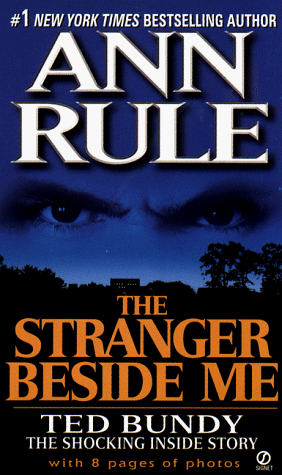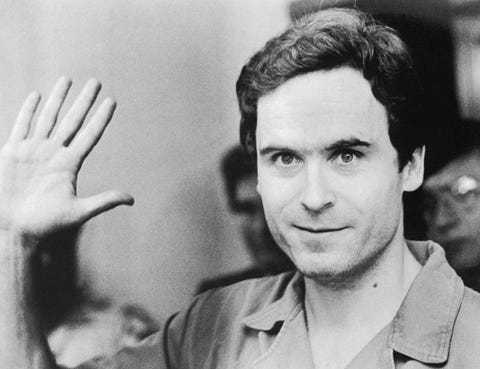- The new Netflix film Extremely Wicked, Shockingly Evil and Vile details the crimes of serial killer Ted Bundy.
- Bundy admitted to killing at least 30 women before he was executed in 1989.
- As a psychology student at the University of Washington in Seattle, Bundy worked at a suicide hotline where he met author Ann Rule, who would write The Stranger Beside Me.
In the new Netflix film Extremely Wicked, Shockingly Evil and Vile, director Joe Berlinger tells the twisted tale of Ted Bundy (played by Zac Efron), a prolific serial killer who confessed to murdering at least 30 women during the 1970s.
If you’ve listened to or watched any of the myriad true-crime podcasts or documentaries (including Berlinger’s Conversations with a Killer: The Ted Bundy Tapes) that detail the case, you know Bundy’s modus operandi—how he’d curry sympathy with women (often by appearing injured and sporting a cast) only to lure them into his Volkswagen Beetle, killing and sexually assaulting them.

But another disturbing (and totally confusing) detail of Bundy’s life that isn’t as widely discussed is the fact that, while studying psychology at the University of Washington, Bundy worked at Seattle’s Suicide Hotline Crisis Center. Yep, that’s right: Ted Bundy helped save lives. (It was at the center that he met and befriended an ex-cop named Ann Rule, who would later go on to write one of the seminal true-crime books about Bundy, The Stranger Beside Me.)
Why would a man hellbent on death and destruction work at a suicide hotline? According to clinical and forensic psychologist Darrel Turner, PhD, it’s all owing to Bundy’s psychopathic nature.
So, what exactly is a psychopath?
A psychopath, says Turner, is someone who preys on other people to get what they want, and Ted Bundy is basically the text-book definition of a “prototypical” psychopath.
“I say ‘prototypical’ because it’s not like one-size-fits all for psychopathy,” Turner explains. “There are certain traits that we tend to see: a lack of empathy and being out for one’s own interest even though the interests of other people get trampled under foot. But with Bundy, we do see a lot of the other traits of psychopathy, like the pathological lying and the being very superficially charming.”
Is psychopathy a mental illness?
Technically, no. In the U.S., health care workers use something called The Diagnostic and Statistical Manual of Mental Disorders (DSM-5, for short) to diagnose mental disorders, and psychopathy is not its own diagnosis.
However, according to Turner, it often falls under the umbrella of antisocial personality disorder, which is in the manual. “It is so widely recognized that when you say that someone’s a psychopath, that means something above and beyond antisocial personality disorder and people recognize what you’re talking about,” Turner says.
Was Ted Bundy ever diagnosed with a mental illness?
Turner says it’s unlikely. “I’m not aware that he was ever evaluated for competency or sanity—I don’t think he ever went that route in terms of the defense,” he says. “They don’t just diagnose people for the sake of diagnosing them because someone’s got to pay for it.”
But, says Turner, given the wealth of information out there about Bundy—largely from interviews he gave before his death by execution in 1989—he feels confident diagnosing him as a psychopath. “No one would argue that,” he says. However, any other diagnoses, without examining Bundy or the people who knew him best, would be pure conjecture.

BettmannGetty Images
So if psychopaths have no empathy, why would Bundy work at a suicide hotline helping people?
Turner points to a few reasons. For one, Bundy was a psychology major, so he may have just been doing it for bonus points at school. “It could be as boring and unsexy as that,” Turner says. But he goes on to offer a few more explanations that play right into Bundy’s psychopathic nature.
“I’m not surprised that he worked at a suicide hotline,” he continues. “Psychopaths will very often put themselves in a position to, in a weird way, learn what normal people are like so they can blend in better by faking emotions that they learn from other people.” Turner says that Bundy’s work there would have given him insight into what people need to hear and feel in order to be persuaded.
“As someone who made a life study of manipulating other people, I think that it makes sense that he would get a job like that.”
Alternately, psychopaths tend to have a god complex, so putting people’s lives in his hands would have fed right into that need. “There’s this grandiose sense of self that comes along with psychopathy,” Turner says. “This sense that you are someone special and that you are a powerful person and a need to feel powerful and a need to feel control, and so I think that working at a suicide hotline satisfied that need in Bundy, as well.”
Wait, so does all this mean that working at a suicide hotline may have made Bundy a more skilled serial killer?
“It’s absolutely a possibility,” says Turner.
Extremely Wicked, Shockingly Evil and Vile, starring Zac Efron and Lily Collins, is streaming now on Netflix.
Source: Read Full Article
